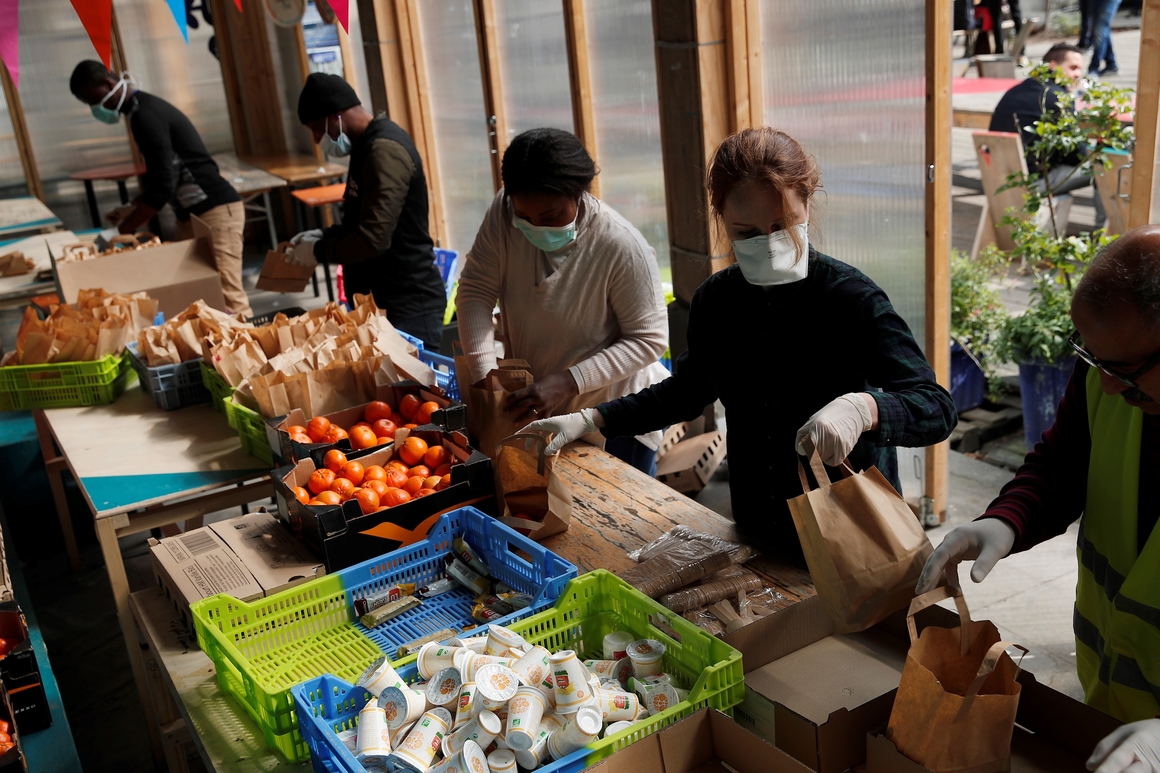
Overall, people have been spending more in supermarkets than before the crisis, driven by stockpiling and restaurant closures.
A dataset from market research firms IRI and BCG for the first week of March shows that sales in the categories of paper products, health care products and packaged food have risen considerably in all three countries. While sales are generally going up, there are some categories of products that recorded losses: in France and Italy, sales of cosmetics dipped, while people in the U.K. and Italy spent less on products classed as general merchandise.
This change in buying habits has put enormous pressure on food supply chains, and hasn’t gone unnoticed by politicians. EU agriculture ministers last week discussed whether they need to adapt policies to what they call “major shifts in consumption patterns,” according to a document seen by POLITICO.
“Demand for higher value products, such as wine, fish, flowers has weakened significantly; in the case of flowers it has completely collapsed. Conversely, demand for shelf-stable products like rice, pasta, eggs, canned goods, long-life fruits and vegetables has risen sharply,” the document said.
Here’s a look at what Europeans are — and are not — buying while in lockdown.
Choosy about booze (and meat)
Sales of alcoholic drinks went up — except for France where they dropped by about 4 percent during the week ending March 8 compared with last year, reportedly driven by a slump in sales of pricier Champagne.
More granular data for Italy from market researcher Nielsen shows that what changed most was which poison people picked. Italians bought less Champagne (about -53 percent during the week of March 9-15 compared with last year). But they bought 14 percent more beer.
Leaders in Rome have been preaching economic patriotism to help buoy the country’s economy amid the crisis, and that seemed to show in the data: Italians bought more „common“ Italian wine (+13 percent) but less wine from abroad (-14 percent).
The data also indicates Italians are becoming choosier about their lockdown lunches and libations.
With children home from school, sales of school snacks and pre-packed lunches plummeted. Sales of fish meals, aromatized water and cheese substitutes for vegan meals also saw declines.
There was a similar shift toward staple foods and away from more exclusive choices of meat: People bought more chicken (+33 percent) but less of pricier veal (-64 percent) and horse meat (-62 percent). Italians picked up more than four times as much rabbit meat that week compared with the year before.
Under lockdown, people also seem to have taken up baking: Sales of flour in Italy almost tripled in the week of March 9-15, as did sales of yeast.
Stocking up on staples
Dry goods were a popular choice across countries.
According to the IRI and BCG report, the data shows stockpiling started to take off on February 16 in Italy and February 23 in France — well before countries started bringing in social-distancing measures in March.
For the week ending March 8, sales of pasta and rice soared by more than 70 percent in France compared with the previous year. Italians stocked up on dried legumes (+61 percent that same week), while Brits hoarded canned meats (+73 percent) and soups (+60 percent). The top — and most surprising — increases in food choices for Italians and the French during this timeframe were packaged mandarins and poultry sausage, respectively, with spending roughly doubling for both.
But the biggest sales increases overall during the first week of March were recorded for those products that Europeans are using to protect themselves against coronavirus: Italians bought 247 percent more denatured alcohol and nearly tripled their purchases of hygienic wipes, also doubling their intake of first-aid products and gloves.
The French spent twice as much on parapharmacy accessories (such as thermometers), bath soaps and cleaning gloves, while Brits also doubled spending on household cleaning and personal hygiene products.
The data from Italy for March 9-15 showed sales of perfumes, hygienic products including razors and depilation wax, and body and lip cosmetics fell sharply.
Source: politico.com
See more here: news365.stream






